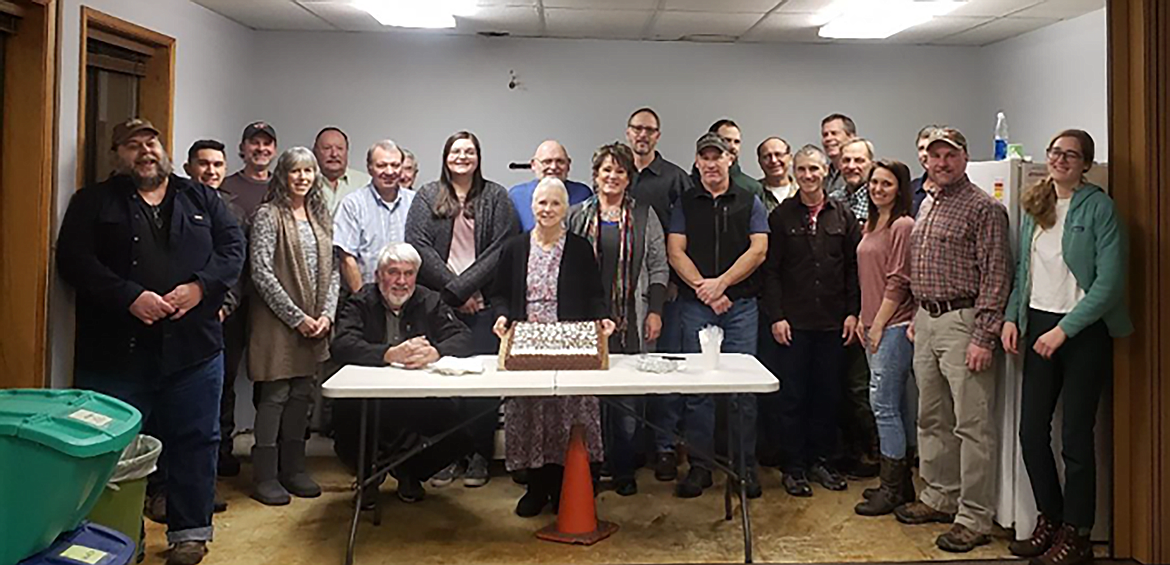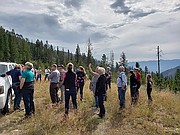KVRI has a long and strong history of success
RHONDA VOGL Contributing Writer | Bonner County Daily Bee | UPDATED 4 years, 9 months AGO
Kootenai Valley Resource Initiative is a local collaborative forum which provides a voice for the community and improves coordination for effectively maintaining, enhancing and restoring the cultural, social and natural resources in Boundary County.
January 2020 started off in celebration of the first monthly KVRI organized meeting, held in January 2002. Happy Birthday, KVRI! Co-Chair Dan Dinning noted that it was 19 years since the group was actually formed (October 2001). KVRI board members and alternates all serve for a two-year term. It is a unique and diverse group that experiences very little turnover and all members were willing to continue to serve and were appointed anew. Cake was enjoyed by the KVRI board and partners, before getting down to business.
The guest speaker for the evening was John Ailport, Inland Forest Management, Inc., who discussed the Hazardous Fuel Treatment Program for private lands. This program has created defensible spaces for homes and focuses on creating fuel breaks around communities, usually at no cost to private landowners.
Kevin Knauth, U.S. Forest Service district ranger, updated the group on the Collaborative Landscape Restoration Project. Nine years ago, the group (USFS and KVRI) applied for and received a $12 million grant for use over a period of 10 years to help increase the pace of restoration. For the past nine years, this funding has been used for science-based ecosystem restoration of priority forest landscapes with emphasis on ecological, economical, and social aspects. Anita Hanson discussed several projects and explained that CFLRP has succeeded in achieving nearly all goals set forth.
CFLRP Accomplishments FY2012 – FY2020
Treatment
Accomplished Target
Reforestation (Planting)
3,391 acres
Pre-Commercial Thinning
4,855 acres
Timber Volume Sold
Approximately 130 mmbf or 14 mmbf/yr
Hazardous fuels reduced
Approximately 24,000 acres
Acres Treated using Timber Sales
9,185 acres
Road Maintenance and Improvement
967 miles
Trail Maintenance and Improvement
2,252 miles
Kevin Knauth discussed the current CFLRP project, the Westside Restoration Project, which was in the scoping phase of the NEPA process. This project encompasses 60,000 acres, including the Cascade, Myrtle, Snow and Caribou Creek watersheds. The development of Westside Restoration Project has included extensive public involvement with outreach to many diverse groups, interested partners and property owners.
KVRI has several subcommittees that focus on individual natural resources, including the grizzly bear subcommittee, which also met in January. As grizzly bear recovery advances, problems may arise and the focus in 2020 was prevention of human/bear conflict, education and outreach, bear attractants and various resources. Local, tribal, state and federal agencies teamed up with landowners to resolve issues arising on private land. Focus on involvement of property owners brought invaluable input to the table and opened doors for robust collaboration and effective problem-solving. For the first time in Boundary County, the sheriff’s office incorporated a NIXLE alert system, and partnered with Idaho Fish and Game, to inform the public of reports of problem bears. Other KVRI subcommittees continued to meet as well: Burbot Recovery, Wildlife-Auto Collision, Wetland-Riparian, TMDL and Forestry.
The February KVRI Board meeting included a presentation on 100 years of climate change, presented by hydrologist Brandon Glaza, USFS. As usual, we touched on our subcommittees’ updates and meetings and had another grizzly bear subcommittee meeting. Kevin Knauth shared the scoping comments on the Westside Restoration Project.
As we moved deeper into the pandemic, we canceled meetings in March, April and May, while doing our best to stay in touch via email and phone, and adjusted to the new restrictions and precautions. In the month of June, we began virtual meetings; each month brought interesting presentations pertaining to our natural resources in the Kootenai Valley.
KVRI board meetings covered topics of interest that affect Boundary County citizens’ way of life and natural resources. Key players were brought to the table to provide connectivity between the community and agencies. Each month featured guest speakers who gave presentations on topics of interest to the public, pertaining to the lower Kootenai River watershed and Idaho Panhandle National Forest.
Throughout 2020, meetings and discussions included selenium impacts to the Kootenai River, the Shared Stewardship program, stream temperature monitoring, wildlife underpass usage, more grizzly bear discussions, conservation easements, the new KVRI website, Libby dam operations, and the Great American Outdoors Act.
Following the presentations, round table discussions were held with updates provided by congressional representatives, local, tribal, federal and state agencies, and private citizens. Subcommittees continued to meet, working on specific issues and sharing information among the various participants.
Each August, KVRI conducts the monthly meeting at the fairground’s covered slab while board members set up the KVRI booth for the Boundary County fair. Due to the pandemic restrictions, we had to forego our annual decorating and dinner party but Kootenai Tribal staff decorated the fair booth, taking all CDC recommended precautions. The 2020 booth incorporated the fair theme “From Pioneer Days to Modern Ways.” The KVRI fair booth provides additional opportunity for outreach and education in the community. Pamphlets on grizzly bears and avoidance of human/bear conflict, educational materials regarding natural resources, Kootenai river habitat restoration and forestry projects were all available to the public. Photos of dedicated Board members, Sturgeon and Burbot Hatchery happenings, KVRI news articles and forestry tours tell the story of KVRI’s far reaching collaborative efforts.
KVRI has shown tremendous progress in 2020 in spite of the many challenges presented by the pandemic. Meetings continued to be very well attended, after we gained a better understanding of how to conduct a virtual meeting; although they presented problems for some members in our community due to slow internet speeds and connectivity issues. KVRI continued to broaden its outreach and increase partnerships in spite of the challenges. From conservation to recreation; agricultural to industrial; historical/cultural/social to environmental and corporate; KVRI is all-inclusive as a public forum for robust discussions and developing common ground.
Last year, KVRI teamed up with the Panhandle Forest Collaborative and the Shoshone Benewah Forest Health Collaborative in a new effort to bring additional federal dollars, earmarked for restoration of national forest land, to the Idaho Panhandle National Forest; collaborating with the Forest Service to compete for federal funding. In 2020, we received the good news that our new joint collaborative proposal was highly rated and may be funded. This is truly “history in the making” for three separate collaborative groups to come together to form a strong alliance for the good of our national forests and communities. We look forward to broadening the scope of restoration on a landscape scale in the Idaho Panhandle National Forest to restore forest health, create job stability, achieve a reliable wood supply, and reduce the costs of fire suppression in overgrown forests.
KVRI has a long and strong history of success and strives to keep the momentum going. With the diversity of partnerships and strength of the Joint Powers Agreement between Tribal, County and City government, the dedicated KVRI Board looks forward to continuing its efforts to create landscapes that are diverse and resilient, improve water quality and reduce impact from disease and invasive species, while providing economic and recreational benefits. KVRI meets the 3rd Monday of each month, 7:00 p.m. via virtual meetings, and welcomes new participants.
For meeting notices and information please visit the KVRI FB page https://www.facebook.com/KVRICommunity/ or the KVRI website www.kvricollaborative.com
Rhonda Vogl is facilitator of the Kootenai Valley Resource Initiative.





